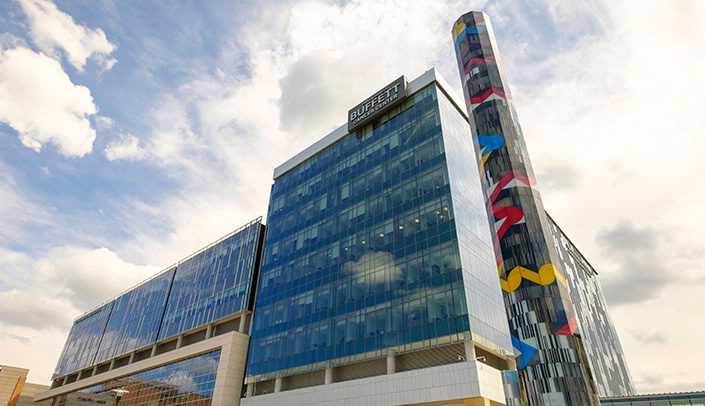The public is invited to an open house on Saturday from 9 a.m. to noon at the new Fred & Pamela Buffett Cancer Center at UNMC.
The facility, which opens to patients in early June, is the largest project ever for the University of Nebraska Medical Center, and its clinical partner, Nebraska Medicine. The project is located at Dewey Avenue and 45th Street.
Light refreshments will be provided. Free parking is available in parking garages at Emile Street and 45th Street or free valet parking in front of the Buffett Cancer Center.
Unique in its design, the Buffett Cancer Center is the most fully integrated cancer center in the world, said Ken Cowan, M.D., Ph.D., director of the Fred & Pamela Buffett Cancer Center. The 615,000-square-foot center, with hallways as long as football fields, puts clinical providers in close proximity with their research colleagues with the goal of more efficiently translating research to patient care.
Providers are focused on breast cancer and other women’s cancers, leukemia and lymphoma, lung cancer, pancreatic and gastrointestinal cancers, prostate cancer and head and neck cancer, as well as the cancers diagnosed in childhood.
As the only National Cancer Institute-designated cancer center in Nebraska, the Fred & Pamela Buffett Cancer Center offers treatment options and clinical trials not found elsewhere. The cancer center includes:
- The Suzanne and Walter Scott Cancer Research Tower, a 10-story, 98-laboratory research tower;
- The C.L. Werner Cancer Hospital, an eight-story, 108-bed inpatient treatment center; and
- A multidisciplinary outpatient center which includes clinics, radiation oncology, surgery, radiology, a 24/7 treatment center, lab and collaborative treatment/diagnostics.
The Buffett Cancer Center also includes specialty operating rooms, a state-of-the-art intensive care unit, a resource and wellness center, a 24/7 treatment center, in-site clinical lab service and patient amenities including the use of high-technology tablets so inpatients can see who their caregivers are, ask questions, see their labs and what tests are coming — all to help alleviate the anxiety typically associated with a hospital stay.
